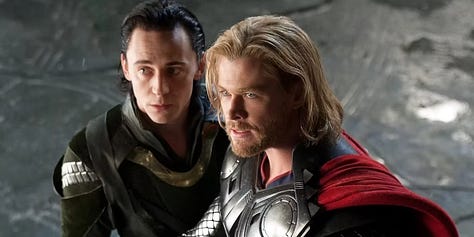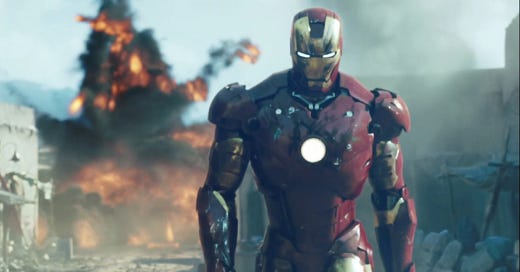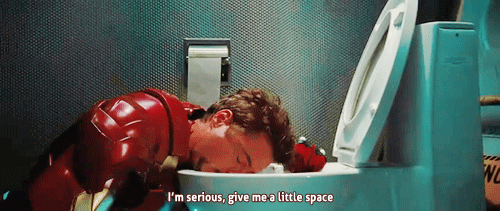I’m Always Angry
Thanks for indulging the past couple of weeks of comic book caprice in the podcast. I think today’s episode (as well as the MCU book) is a worthwhile listen for anyone interested in the movie-making business, as well as my fellow comics readers, journalists, and Hulk fans.
In today’s Writers Panel, journalists Joanna Robinson and Dave Gonzales, the authors of MCU: The Reign of Marvel Studios, discuss making a living as “pop culture pundits,” mapping the story of the Marvel Cinematic Universe, the missing “DC vs Marvel” chapter, lessons the MCU might take from recent successes like Deadpool & Wolverine and Agatha All Along, what other franchises might learn from the MCU, what Kevin Feige really does, and what the MCU can teach writers.
Get the podcast via Apple or Spotify or Acast or your favorite podcast app.
MC-You
As I mention in the episode, I really enjoyed MCU: The Reign of Marvel Studios. No surprise, as I am a big fan of the Marvel Cinematic Universe and, truly, I am stunned by what they built over a decade of movie-making. The sheer ambition and scope of it is a (ahem) marvel. And the fact that, especially in the ten years that culminated in Avengers: Endgame1, the quality of the films was overwhelmingly high.






I’ve been somewhat chasing after MCU writers in the years before this terrific book, as I wanted to learn about how such a staggering, multi-faceted achievement is put together.
Here’s my conversation with Christopher Markus and Stephen McFeely who joined the fold with the first Captain America movie and went on to become architects of the entire MCU, along with their collaborators, directors Joe and Anthony Russo, and MCU mastermind Kevin Fiege.
One of my last live Writers Panel episodes was with writer/director Shane Black. Black is, of course, a superstar screenwriter, known for Lethal Weapon, The Last Boy Scout, and Kiss Kiss Bang Bang, but we spent a good deal of time (likely more than he or anyone else expected) talking about Iron Man 3, which he wrote and directed, and which I consider one of the best MCU films. It stands alone pretty well, the baggage of the serialized universe introduced deftly and emotionally. It’s also, like most of Shane’s work, a Christmas movie, so you have no excuse not to watch it this month! You can hear our conversation here.
And of course, Doctor Strange writer C. Robert Cargill has been a wonderful guest and great supporter of this newsletter and the podcast. Cargill is known best as a horror writer, of course, collaborating with director Scott Derrickson on films like Sinister and The Black Phone. Our first conversation, which touched on some MCU stuff, was in 2018 on Austin Film Festival’s “State of the Scare” panel.
Cargill was more candid about his and Scott’s time working in the MCU in our very first paid-subscriber-exclusive live Zoom Q&A back in 2022. I included some of Cargill’s terrific advice and insights in this episode, but if you become a paid subscriber, you can hear the whole damned exciting thing. I even made a helpful tab on the front page of this site called “Q&A recordings” so they’re all easy to find.
Cargill also has one of my favorite quotes from MCU: The Reign of Marvel Studios. It’s one that we should all keep in mind as writers, whether we’re working on something as complicated and monster-budgeted as the latest Marvel movie or our little horror indie (like I’m writing now!) or your own sample pilot or feature script.
Cargill summarized Feige’s thesis, which rested on a scene in Star Trek V where Kirk, Spock, and McCoy eat beans by a campfire: “You cannot find a great character moment in [Star Trek]: The Motion Picture that comes close to matching anything with the campfire scene, and the campfire scene gives us our three favorite characters from the show together, outside of the norm, and lets us experience who they are as people and not legends.” Feige took pains, Cargill realized, to include “the DNA of that campfire scene in every Marvel movie. He wants to take your favorite characters and give you the campfire scene, and give you that sequence in which you just love these people for who they are as people, regardless of their powers, so that when the big stuff happens, you really care about it.”
I’ve talked about this before. But it’s something that I urge you to keep in mind as you spend the next weeks, months, year working on your new material. Remember why we tell stories.
Remember that storytelling is about emotion. It’s about characters for whom we feel something.
“That’s the job,” Marvel producer Craig Kyle says in the MCU book. “How do we grab people out of the gate, and by the time we start pulling funny business on them, they’re already too emotionally in to walk out? If you lean too much towards the explanations of the magic or the bullshit sci-fi, you just end up pushing people away.”
Remember who your people are. Remember why you’re telling this story. Then tell it with passion.
Enjoy your holidays, folks. Hope to see many of you next year at our Q&As and elsewhere. Keep writing.
Okay, actually in its coda Spider-man: Far From Home; see, nerds? I am like you.









That MCU book is fantastic.
Digging the comics coverage, Ben, and Cargill especially is one of my favorite writers and talkers-about-writing. Hope you’re having a hellaciously happy Holiday, thanks *so* much for everything in 2024, and here’s to one heck of a fine 2025 for us all!✨